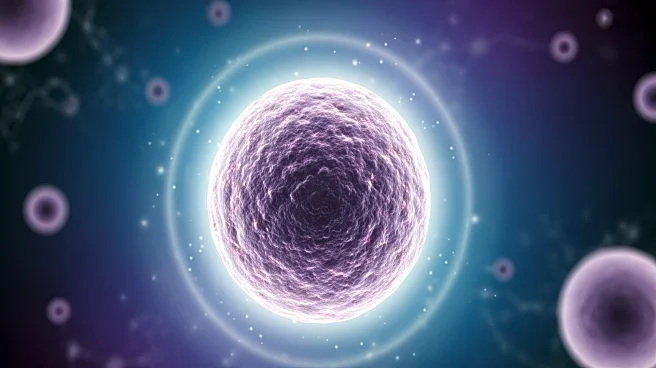What's Happening?
Researchers at Weill Cornell Medicine have identified a molecular cue used by cancer cells to exhaust T cells, which are crucial for destroying cancerous cells. The study, published in Nature Immunology, reveals that tumors not only evade the immune system
but also alter immune cells to reduce their effectiveness. The research highlights the role of CD47, a molecule found on cancer cells, in pushing T cells toward exhaustion. Experiments showed that mice lacking CD47 had slower tumor growth, indicating that the exhaustion effect originates from CD47 on immune cells rather than cancer cells. The study also explored the interaction between CD47 and thrombospondin-1, a protein produced by metastatic cancer cells, and found that blocking this interaction with a peptide called TAX2 helped maintain T cell activity and slowed tumor progression.
Why It's Important?
This discovery is significant as it offers a potential new avenue for enhancing cancer immunotherapy. By reviving exhausted T cells, the research could lead to more effective treatments for cancer patients, particularly those who do not respond well to current immunotherapies. The ability to block the exhaustion signal could serve as a standalone therapy and may also improve the efficacy of existing treatments, such as PD1 immunotherapy. This advancement could potentially increase the number of patients who benefit from immune-based therapies, offering hope for more durable and robust cancer treatments.
What's Next?
The research team plans to further study the modulators that regulate the TSP-1:CD47 pathway and develop methods to selectively disrupt this pathway to improve T cell-based cancer immunotherapy. Future experiments will explore the therapeutic angle of inhibiting both PD1 and CD47, which early animal model tests suggest could create T cells significantly better at destroying cancer cells. The researchers aim to advance this approach to clinical trials, potentially leading to new treatment options for cancer patients.
Beyond the Headlines
The study underscores the complexity of cancer's interaction with the immune system and highlights the potential for innovative therapies that leverage the body's natural defenses. The ethical dimension involves ensuring that new treatments are accessible to all patients, regardless of socioeconomic status, and that they are developed with transparency regarding collaborations and funding sources. Long-term, this research could shift the paradigm in cancer treatment, focusing more on empowering the immune system rather than solely targeting cancer cells.















